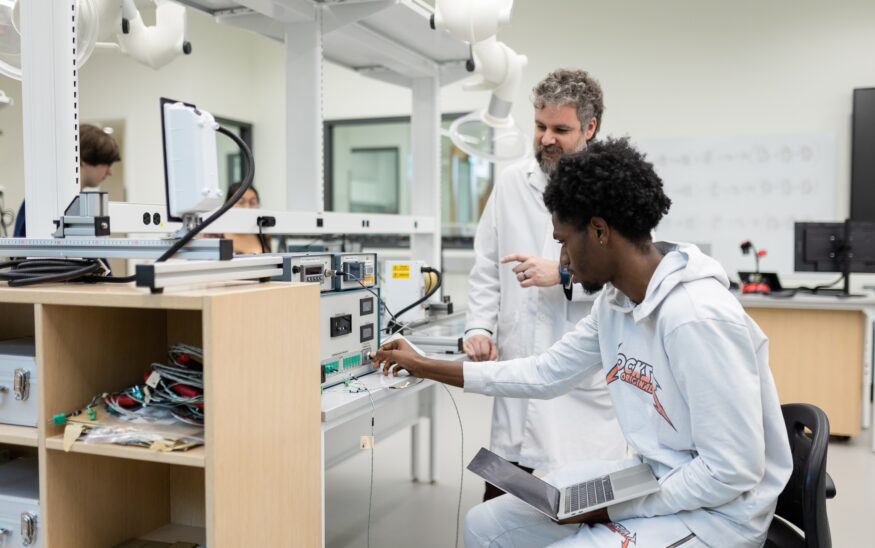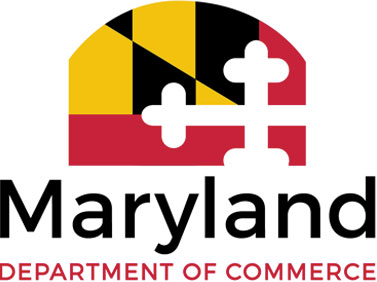Unique MATRIX Lab makes southern Maryland a standout education partner for local STEM employers

As the hub of Maryland’s innovation ecosystem, TEDCO celebrates the university and higher education partners that are essential to building regional STEM pipelines and creating spaces for cutting-edge research and innovation with local STEM industry.
Some great examples of this are found in Southern Maryland, where the University of Maryland (UMD) and the University System of Maryland at Southern Maryland (USMSM) collaborate with and support the Naval Air Systems Command (NAVAIR) and the Naval Air Warfare Center Aircraft Division (NAWCAD), where 25,000 civilian, contract and military personnel work at the navy’s busiest flight test center.
The UMD MATRIX Lab, a high-tech research and education facility located in the SMART Building in St. Mary’s County, Md., supports basic, applied and operational autonomous technology research and responds to the needs of local industry and government organizations, including the Navy. The new USMSM facility is located in the heart of the AeroPark Innovation District. The AeroPark district brings together, aerospace small and large firms, academia, and the US Navy. This new district helps facilitate partnerships between USMSM and UMD and the wider regional industrial base partnerships including curriculum development, hiring adjunct faculty from NAWCAD, joint research work and working with industry on internship opportunities.
“Collaborating across sectors is crucial to a thriving tech ecosystem,” said Troy LeMaile-Stovall, TEDCO CEO. “The creation of the UMD MATRIX Lab in proximity to its southern Maryland Naval sites has allowed for more innovation across the region, from collaborative research to student exposure to NAWCAD professionals and faculty. The lab and its many partnerships offer an excellent example of how Maryland’s universities develop local talent and foster an entrepreneurial ecosystem.”
From left to right in video: John Slaughter, UMD UAS Research and Operations Center (UROC); Troy LeMaile-Stovall, TEDCO CEO; Matt Scassero, Director of Operations and Outreach, Clark School of Engineering at USMSM MATRIX Lab.
The MATRIX Lab offers a world-class educational experience
The word “Matrix” may conjure up the famous film series and its man against machine alternative reality. While there’s no sign of actors Keanu Reeves or Laurence Fishburne, at Southern Maryland’s MATRIX Lab there are plenty of cutting-edge innovations. Engineers and scientists populate this high-tech research and education facility which serves industry, government, academia, and the people of Southern Maryland.
The MATRIX Lab maintains multiple affiliations and partnerships with the Department of Defense, including NAWCAD. Its unique features were built to advance autonomy and uncrewed systems. The Lab includes an Open Air-Land Lab, a Fluid Dynamics Tank (water tunnel), a wind tunnel, an Anechoic Chamber, a Project Assembly Area and an Outdoor UGV Playground, a testing area for robotic ground vehicles.
It’s a timely and crucial investment for the Southern Maryland autonomy corridor. Just ask Anthony Malatesta, a NAVAIR propulsion senior thermal scientist who has visited engineering education programs around the world; he counts the STEM academic program, with its access to the MATRIX Lab, as one of the best he’s seen.
“You have this program with unbelievable resources in the facilities, the hardware, the world class educators with diverse backgrounds, and the small classes,” said Malatesta. “Students can have one-on-one interactions with incredibly knowledgeable people here.”
Professor Malatesta is one of those people, offering students his insights on fluid mechanics, heat transfer, material science and aircraft energy systems from the perspective of a practicing NAVAIR propulsion thermal scientist.
He also has a personal stake in this venture. Raised in southern Maryland, Malatesta began his career as an undergraduate student at the engineering program where he now teaches, completing his doctorate at UMD. The talented Malatesta chose to teach at USMSM because he wants to help grow the diverse talent in Southern Maryland that contributes so deeply to the success of the community.
NAVAIR and NAWCAD are eager for more graduates and employees like Malatesta. They also welcome the opportunity to collaborate on cutting edge research, another important component of the MATRIX Lab and a major reason for locating it close to the naval base.
Charles Rea, the chief technologist for autonomy and AI at NAWCAD, notes that working together, NAWCAD and the UMD MATRIX Lab can collaboratively find solutions to complex defense problems.
“Interacting with the University of Maryland, the University System of Maryland in Southern Maryland, and the Matrix Laboratory allows us to experiment in a rapid environment external to the base; it allows us to test technologies that haven’t got through the door yet,” said Rea.
With innovative facilities like the SMART building and MATRIX Lab, UMD and USMSM are essential partners in building the workforce of Southern Maryland’s vibrant and growing autonomy corridor.


